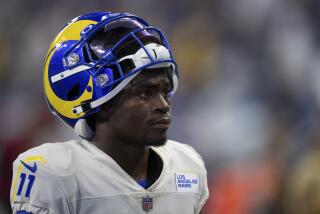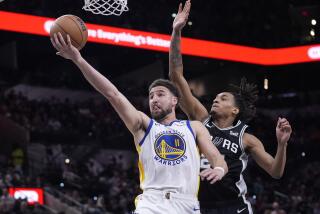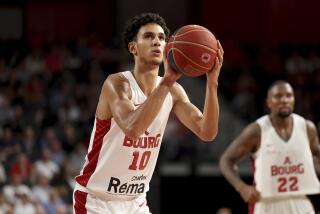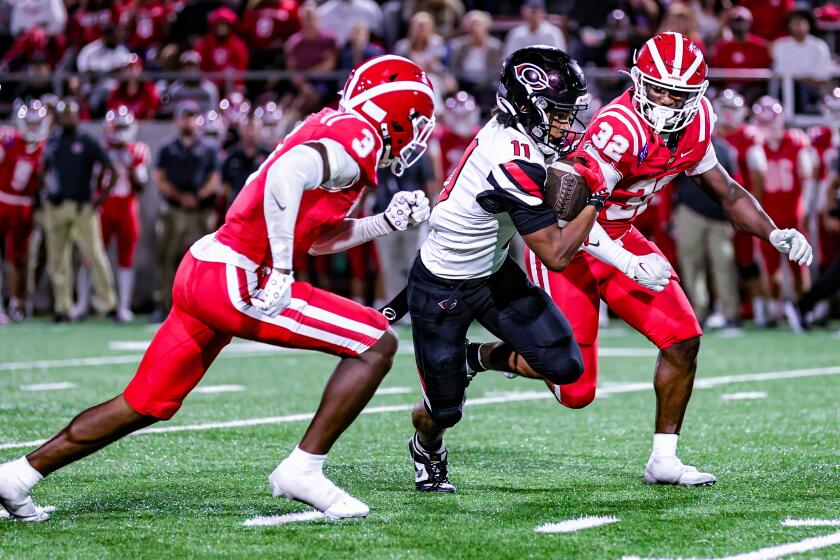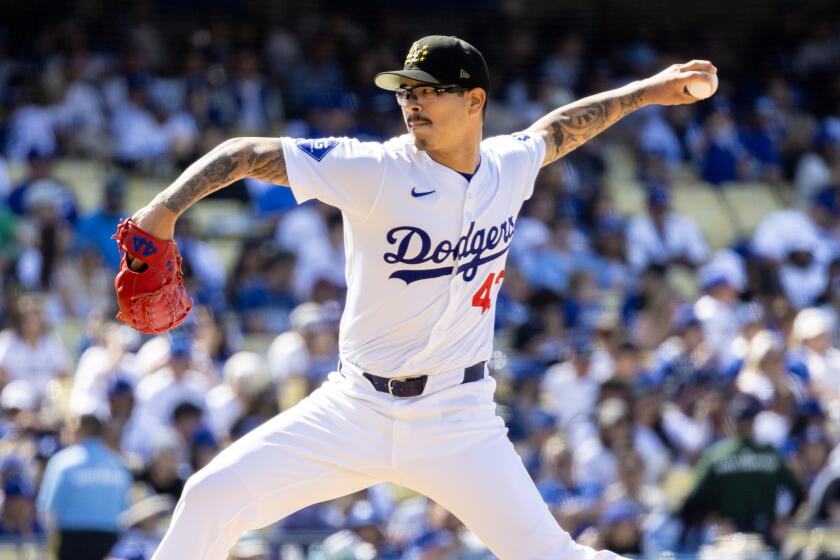Kings’ Derrick Williams tries to get a footing in the NBA
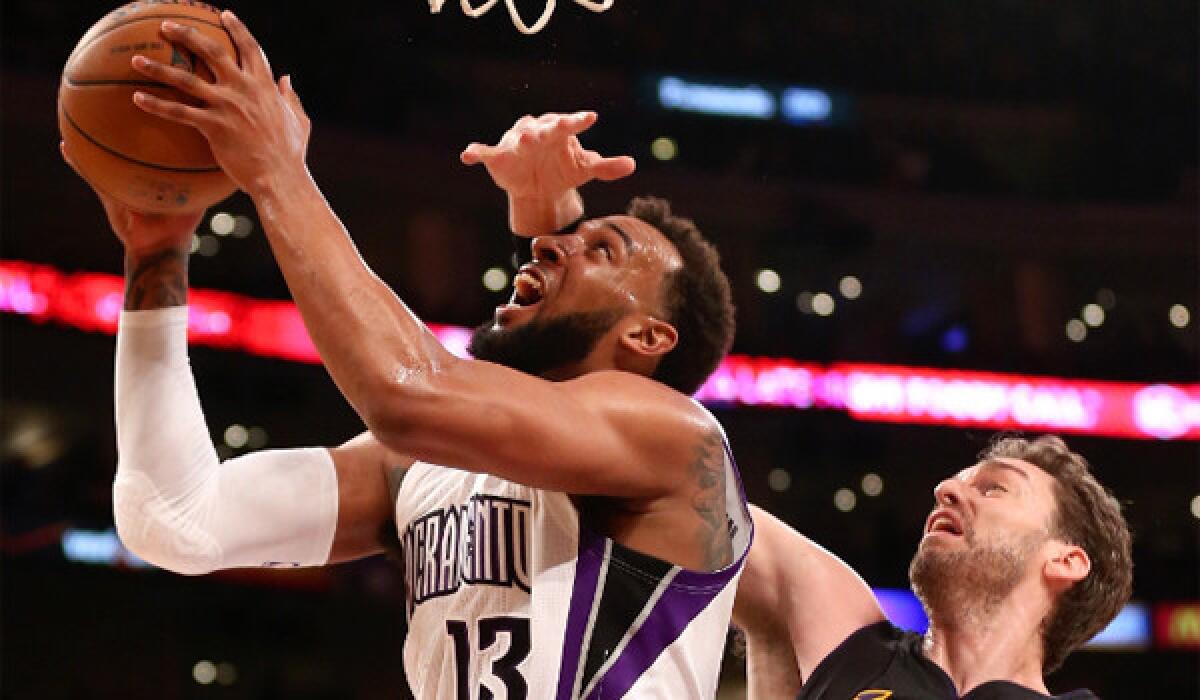
Sacramento’s Derrick Williams collected 26 points and 12 rebounds Friday night during the Kings’ loss to the Lakers
Four, three, two …
The Derrick Williams position countdown goes on, the No. 2 pick in the 2011 draft still trying to find his spot in the NBA before time runs out.
The Minnesota Timberwolves tried him at power forward and small forward before deciding neither worked and trading him in November to the Sacramento Kings. Williams now plays both positions as well as occasional stints at shooting guard.
Like a 300-pound man shopping for pants, the right fit has been elusive.
Some nights, Williams looks like a star. He tallied 31 points in a Sacramento victory over the Dallas Mavericks in December and collected 26 points and 12 rebounds Friday night in the Kings’ loss to the Lakers.
Other times, his presence is negligible. He will hoist an occasional jumper and hardly resembles the dynamic dunker who seemed to be having so much fun while starring for Arizona in college.
Nearly three seasons into his NBA career, Williams knows where he wants to go but doesn’t seem quite sure how to get there.
“I want to regain the Derrick Williams that I have been before,” he said Friday at Staples Center after Sacramento’s morning shoot-around.
The trade that sent him to the Kings seemed like a good beginning. He started his first seven games before the team made him somewhat redundant as a starter by acquiring small forward Rudy Gay.
It has been mostly back to the bench since then. He started against the Lakers on Friday because DeMarcus Cousins was serving a one-game suspension for punching Houston’s Patrick Beverley.
Williams’ big games have mostly come in the ones he has started, but Kings Coach Mike Malone said Williams’ production has also been closely linked to his mindset.
“We’ve all seen it,” Malone said. “He plays at his best when he’s aggressive and he’s confident and he gets out and runs the floor and he attacks the basket and plays above the rim. When he settles for jump shots and is not as aggressive, he becomes a lot easier to guard.”
At 6 feet 8 and 235 pounds, Williams said he’s the lightest he has been since he played for La Mirada High. He lost 15 pounds at the behest of the Timberwolves, who wanted to find out whether a more svelte Williams might be better suited to small forward.
He never really got the chance this season, averaging only 4.9 points in 14.7 minutes per game before the trade.
Williams said there is an upside to playing either forward position but acknowledged a preference for small forward.
“I feel more comfortable at the three just because I’m not as big as some fours in the NBA,” he said, “but when I’m at the four, I’m quicker than most of them.”
Some don’t believe either spot works for Williams.
“He isn’t skilled enough to be a three and he doesn’t have the size or post game to be a four,” said one league executive, speaking on condition of anonymity because he did not want to publicly criticize a player on another team. “His ceiling was always going to be [veteran journeyman] Al Harrington.”
Williams has at least been playing more with the Kings, averaging 10.0 points and 4.7 rebounds in 26.6 minutes per game. He has one more season left on his contract for $6.3 million and said he would like to remain part of a young core that also includes Gay, Cousins, Isaiah Thomas and Ben McLemore, all in their 20s.
The team’s potential has been reflected in victories over Miami, Portland and Houston (twice), though the Kings have the second-worst record in the Western Conference.
Still only 22, Williams is nowhere near ready to give up on his team or himself, even if he’s not where he thought he would be at this point of his career.
“I would probably say I’m a little bit behind just because I really haven’t gotten the opportunity to get out there and play,” he said. “I’ve seen some guys on other teams that got drafted top five that play 40 minutes a game whether they’re playing good or bad.
“I think sometimes that’s a good thing and it can be a bad thing. When you’re being thrown into the fire and being able to learn from mistakes and things like that, I think that does work. I haven’t really had that opportunity, besides when I [first] got here.”
He hopes to get the chance again, before anyone else tries to categorize him as a disappointment.
Twitter: @latbbolch
Times correspondent Eric Pincus contributed to this report.
More to Read
Go beyond the scoreboard
Get the latest on L.A.'s teams in the daily Sports Report newsletter.
You may occasionally receive promotional content from the Los Angeles Times.
